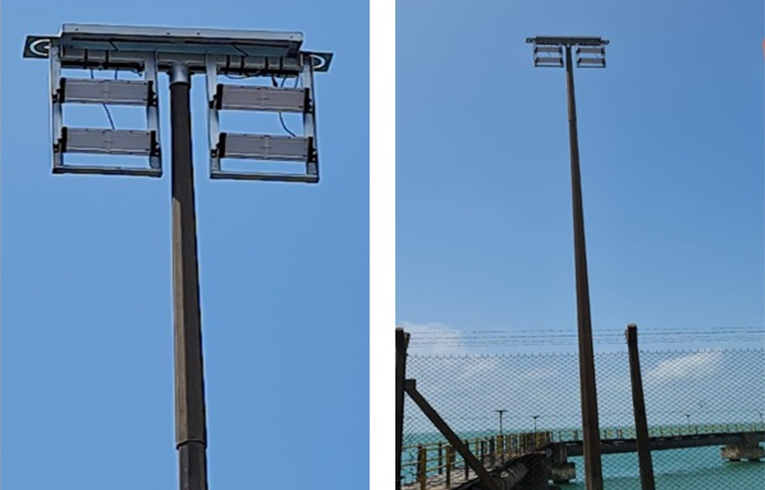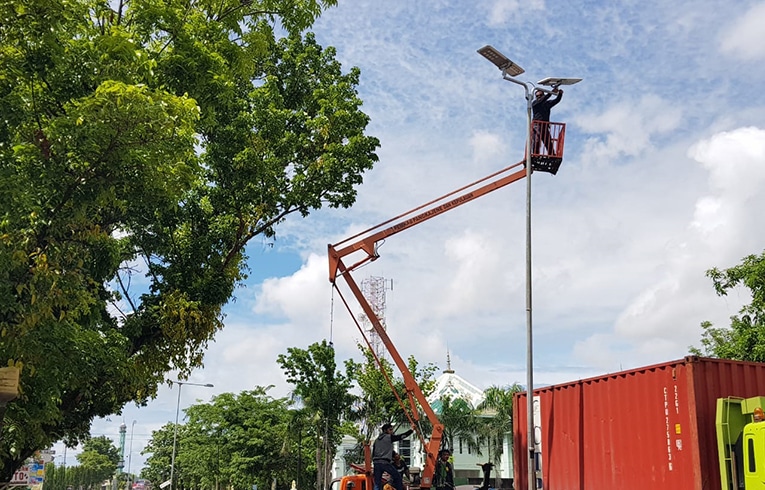In today’s competitive solar light market, it is essential for dealers to offer customers high-performance batteries that will ensure their lights stay powered and perform reliably. Rechargeable batteries are a great way for buyers to save money by reducing the need to purchase new AA or AAA batteries every few months. But with so many rechargeable battery options on the market, selecting which ones are best suited for solar lights can be tricky. In this blog post, we’ll demystify the process of choosing rechargeable batteries for your customer, helping you select products that exceed expectations while providing long-term value and dependability.
Why Rechargeable Batteries are Beneficial for Solar Lights?
echargeable batteries are beneficial for solar lights for several reasons:
-
Eco-friendly: Rechargeable batteries reduce waste by allowing multiple uses before needing replacement, unlike disposable batteries that must be discarded after one use. This reduces the environmental impact associated with battery disposal.
-
Cost-effective: Although rechargeable batteries may have a slightly higher upfront cost, they can save money in the long run by eliminating the need for frequent battery replacements. Over time, this can result in significant savings.
-
Self-sustaining system: Solar lights with rechargeable batteries create a self-sustaining system that harnesses solar energy during the day to charge the batteries, which then power the lights at night. This eliminates the need for an external power source and reduces electricity consumption.
-
Reliability: Rechargeable batteries can provide consistent performance for solar lights, ensuring that they remain operational even during cloudy days or periods of low sunlight exposure. This helps maintain a reliable source of illumination for your outdoor space.
-
Low maintenance: Solar lights with rechargeable batteries require minimal maintenance, as the batteries automatically recharge during the day without any user intervention. This makes them an ideal choice for outdoor lighting that is both convenient and hassle-free.
-
Flexible installation: Since solar lights with rechargeable batteries don’t require electrical wiring, they offer greater flexibility in terms of installation locations. This allows you to place solar lights in areas where it would be difficult or costly to install traditional wired lighting.

Different Types of Rechargeable Batteries and How They Perform for Solar Lights
-
Nickel-Cadmium (NiCd) Batteries
- Pros: Low cost, resistant to overcharging, and can withstand a high number of charge-discharge cycles.
- Cons: Lower energy density, prone to memory effect (capacity loss if not fully discharged before recharging), and contains toxic cadmium, making them less environmentally friendly.
- Performance: NiCd batteries are suitable for basic solar lights but may not be the best choice for high-performance solar lighting due to their lower energy density and environmental concerns.
-
Nickel-Metal Hydride (NiMH) Batteries
- Pros: Higher energy density than NiCd, fewer memory effect issues, and more environmentally friendly as they do not contain toxic heavy metals.
- Cons: Sensitive to high temperatures, may require a longer charging time, and can have a higher self-discharge rate.
- Performance: NiMH batteries are a good choice for solar lights, offering improved performance over NiCd batteries and fewer environmental concerns. However, they may require longer charging times and may not be the best option in extremely hot climates.
-
Lithium-Ion (Li-ion) Batteries
- Pros: High energy density, lightweight, low self-discharge rate, and long cycle life.
- Cons: More expensive, sensitive to high temperatures, and may require protection circuits to prevent overcharging or deep discharging.
- Performance: Li-ion batteries offer excellent performance for solar lights, providing bright illumination and long runtimes. However, they may not be suitable for all budgets and may require additional protection mechanisms.
-
Lithium Iron Phosphate (LiFePO4) Batteries
- Pros: High energy density, long cycle life, stable performance, excellent thermal stability, and environmentally friendly.
- Cons: Higher upfront cost and may require a specific charger or solar panel voltage for optimal charging.
- Performance: LiFePO4 batteries are an excellent choice for solar lights, offering superior performance, safety, and environmental benefits. They are particularly well-suited for high-performance solar lighting systems but may not be the most budget-friendly option.
Pros and Cons of Different Battery Brands
-
Duracell
- Pros: Well-known brand, reliable performance, long shelf life, and wide availability.
- Cons: Slightly higher cost compared to some other brands.
-
Energizer
- Pros: Reputable brand, consistent performance, long-lasting batteries, and extensive product range.
- Cons: Can be more expensive than other brands.
-
Panasonic
- Pros: High-quality batteries, long cycle life, excellent performance, and a trusted brand.
- Cons: May be less widely available than Duracell or Energizer and can be more expensive
Tips for Choosing the Right Rechargeable Battery for Your Solar Lights
-
Check compatibility: Ensure the battery type, size, and voltage are compatible with your solar light’s specifications. Consult the manufacturer’s recommendations or user manual for guidance.
-
Consider battery capacity: Look for batteries with a higher milliampere-hour (mAh) rating, as they can store more energy and provide longer runtimes for your solar lights.
-
Select the appropriate battery chemistry: Choose between Nickel-Cadmium (NiCd), Nickel-Metal Hydride (NiMH), Lithium-Ion (Li-ion), or Lithium Iron Phosphate (LiFePO4) batteries, considering their pros and cons in terms of performance, cycle life, and environmental impact.
-
Opt for low self-discharge rates: Look for batteries with low self-discharge rates, especially for NiMH batteries. This ensures that the battery retains its charge for longer periods when not in use, which is beneficial for solar lights that only operate at night.
-
Prioritize quality and reliability: Choose reputable battery brands known for their quality and reliability to ensure consistent performance and a longer lifespan for your solar lights.
-
Read reviews: Check customer reviews and ratings for the batteries you’re considering, as they can provide valuable insights into real-world performance and potential issues.
-
Consider temperature sensitivity: If you live in an area with extreme temperatures, opt for batteries that perform well under such conditions. For example, LiFePO4 batteries have better thermal stability than Li-ion batteries, making them a better choice in hot climates.
-
Weigh cost vs. performance: While it may be tempting to choose the cheapest option, consider the long-term benefits of investing in higher-quality batteries that offer better performance and lifespan. This can save you money and hassle in the long run.
How to Maintain and Store Your Rechargeable Batteries Effectively
-
Charge properly: Follow the manufacturer’s recommendations for charging your batteries, including the appropriate charging current, voltage, and duration. Overcharging or undercharging can negatively impact battery performance and longevity.
-
Avoid over-discharge: Prevent your batteries from being completely drained, as this can cause damage and reduce their overall lifespan. Most devices automatically shut off when the battery voltage drops below a certain level, but it’s still a good idea to recharge your batteries before they’re completely depleted.
-
Store at the right temperature: Store your batteries in a cool, dry place away from direct sunlight and extreme temperatures. High temperatures can accelerate the self-discharge rate and potentially damage the battery chemistry.
-
Use the right charger: Always use a charger designed for your specific battery type and chemistry. Using an incorrect or low-quality charger can result in improper charging, which may harm the battery and reduce its lifespan.
-
Clean the contacts: Keep the battery contacts clean by wiping them gently with a soft cloth or cotton swab dipped in isopropyl alcohol. Dirty contacts can lead to poor electrical connections and reduced performance.
-
Charge before storage: If you plan to store your batteries for an extended period, charge them to around 40-60% before putting them away. Storing batteries at full charge or completely empty can decrease their overall lifespan.
-
Store in a protective case: To prevent short-circuiting or damage, store your batteries in a protective case or container that keeps them separated from each other and from metal objects.
-
Regularly check stored batteries: Periodically check your stored batteries to ensure they maintain an appropriate charge level and show no signs of swelling or leakage.
-
Dispose of damaged batteries: If you notice any signs of battery damage, such as swelling, leakage, or corrosion, dispose of the battery safely and according to local regulations.

Troubleshooting Common Problems with Solar Lights and Rechargeable Batteries
If you’re experiencing issues with your solar lights, it’s essential to troubleshoot the problem to identify the root cause. Here are some common problems with solar lights and rechargeable batteries, along with possible solutions:
-
Solar lights not turning on or working intermittently
- Ensure that the solar panel is clean and receiving adequate sunlight during the day.
- Check if the light sensor (photocell) is functioning correctly. Cover the sensor to see if the light turns on in a dark environment.
- Inspect the wiring for any damage or loose connections.
- Replace the rechargeable battery if it’s old or no longer holding a charge.
-
Short runtime or dim lights
- Make sure the solar panel receives enough sunlight during the day for optimal charging.
- Clean the solar panel to ensure it’s free of dust and debris.
- Check if the battery capacity (mAh) is sufficient for your solar light’s requirements.
- Replace the rechargeable battery if it’s not holding an adequate charge.
-
Battery not charging
- Verify that the solar panel is positioned correctly to receive maximum sunlight.
- Clean the solar panel to improve its efficiency.
- Check for any damage or loose connections in the wiring.
- Ensure you’re using the correct type and size of the rechargeable battery.
- Replace the battery if it’s old or damaged.
-
Lights turn on during the day
- Check if the light sensor (photocell) is functioning correctly and not obstructed by dirt or debris.
- Ensure that the solar panel is installed correctly and not casting a shadow on the light sensor.
- If the problem persists, the light sensor may be faulty and require replacement.
-
Flickering or flashing lights
- Inspect the wiring for any damage or loose connections.
- Check if the battery contacts are clean and making proper contact.
- Replace the rechargeable battery if it’s not holding a charge or if it’s nearing the end of its lifespan.

Conclusion
Rechargeable batteries are a great option for powering your solar lights because of their environmental friendliness and cost-effectiveness. Depending on your needs, you may choose from either lithium-ion or nickel-metal hydride batteries– both have their pros and cons. It’s important to consider the battery brand when shopping for long lasting performance, as well as how you maintain and store them effectively. Furthermore, knowing how to troubleshoot common problems with solar light and rechargeable battery can save you energy, time and money in the future. We’ve discussed all you need to know about using rechargeable batteries in your solar lights in this blog post – if you’re still not sure which battery is best for your application or if there is something that wasn’t answered here, don’t hesitate to reach out to our product managers!
Table of Contents